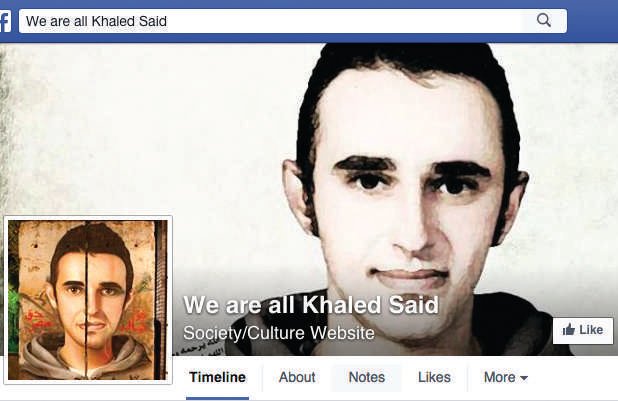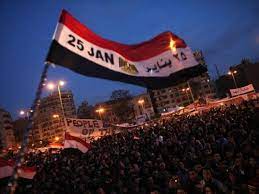I’m sure many of us are familiar with the terms social media activism and Facebook Revolution. Thanks to the internet, it is now possible to speak up and protest for important issues, all from the comfort of one’s bed. Or is it? Can social media really be considered a space for contestation and if so, what are the limitations of this space? With these questions in mind, I want to look at one specific example of how social media was harnessed before and during the Arab Spring in 2011.
In the months leading up to the January 25 Revolution in Egypt, social media platforms such as Facebook and Twitter were used by many Egyptians to express their dissatisfaction and frustration with the country’s oppressive regime. They blamed the Egyptian government for the high levels of unemployment and the poor living conditions that many, especially those residing in cities, were forced to deal with. Among the numerous Facebook pages that were created, one in particular called ‘We are all Khaled Said’ stands out. The page was set up in June 2010 by Wael Ghonim, an Egyptian Google Executive, after photos of a young Egyptian, Khaled Said, who was beaten to death by police surfaced online. ‘We are all Khaled Said’ gathered hundreds of thousands of followers within the span of three months and eventually became one of the main pages to promote the January 25 Revolution. This mobilisation of people was done in four phases, each of which demonstrates how social media activism can be used as a space for contestation. 1

- To start, public support for the page had to be garnered. This was done through the use of the pronoun “I”. Ghonim deliberately used this pronoun to create a feeling of informality but also, it made it more personal for members as they felt like there was an individual behind the page, and not some kind of organisation. In addition to the the use of the pronoun “I”, posts were written in the colloquial Egyptian dialect. This helped to attract support and attention from young Egyptians. 2
- The next phase involved encouraging members to interact with the content. This was done by commenting or liking posts. Although we often don’t put much though into liking posts, for many of these young Egyptians, it was their first time engaging with political material. 3
- The third phase built on this engagement. People were now were encouraged to actually participate on the page by joining online campaigns. One example of these online campaigns was when members were asked to photograph themselves holding a sign that read “We Are all Khaled Said” in Arabic. Another example was when members were invited to change their profile picture to a banner of Khaled Said in front of the Egyptian flag with the caption “Egypt’s martyr”. 4
- The final phase of mobilisation was to bring the activism from the virtual world and onto the streets of the cities. This eventually happened when a fruit seller in Tunisia set himself on fire in protest, leading to demonstrations across the Arab world. 5

I believe that the Facebook page did more than just promote the January 25 Revolution: it in itself served as a space of contestation. Members were able to engage in participatory democracy through engagement with the posts. In addition, the online events organised were an opportunity for young Egyptians to build courage and confidence. Many of these young people had never even been politically active before. Of course, there were and are limitations to social media activism, mainly its accessibility. Not everyone has access to the internet nor the ability to protest safely. That being said, I feel there can be power behind social media activism when there is a clear goal, and people guiding the movement.
Footnotes
Wael Ghonim’s book: Revolution 2.0: The Power of the People Is Greater Than the People inPower. UK: Harper Collins, 2012.
‘We are all Khaled Said’ Facebook Page: https://dailynorthwestern.com/tag/we-are-all-khaled-said/
Image from January 25 Revolution in Cairo: https://www.albawaba.com/slideshow/jan-25-egypt-celebrates-anniversary-renewed-revolution-409926


Recent Comments